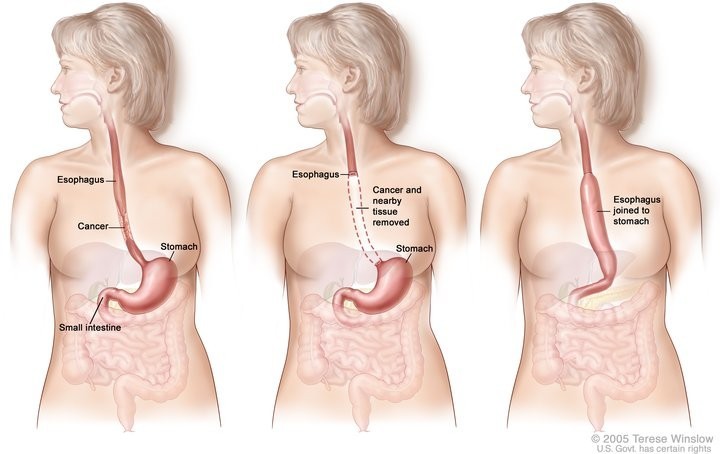
Esophageal Cancer Found Early, Treated With Minimally Invasive Surgery
Robin Gibson, 59, of Madeira, says acid reflux runs in his family. "Virtually everyonehis parents, siblings, cousins and kidshas dealt with the condition
Acid reflux, known medically as gastrointestinal reflux disease, occurs when there is a breakdown of the protective mechanism between the esophagus and the stomach. Left untreated, chronic reflux can lead to a precancerous condition called Barretts esophagus that puts certain patients at higher risk for esophageal cancer.
Unfortunately, Gibsons brother was one of those peopleand esophageal cancer took his life at age 41.
"When my brother had cancer, people were not as aware that acid reflux could lead to esophageal cancer, Gibson recalls. "Because of his experience, when I was diagnosed with Barretts esophagus in 2002 I knew I had to take it very seriously. I was at increased risk for esophageal cancer.
Gibson began annual follow-ups with a gastroenterologist, managing his acid reflux with medication and undergoing an esophagus scope annually to monitor tissue changes indicative of cancer.
In 2008, his scope revealed very early stage esophageal cancer. Gibson was referred to the UC Cancer Institute esophageal cancer team for treatment at UC Medical Center (formerly University Hospital).
UC Health surgical oncologists and thoracic surgeons worked together perform the complex minimally invasive esophageal cancer surgery (esophagectomy) required to eliminate Gibsons cancer.
Esophagus Cancer Surgery
The goal of an esophagectomy operation is two-fold: to remove the cancerous tumor and enough surrounding tissue to ensure cancer-free margins and to re-establish gastrointestinal continuity. Within the UC team, surgical oncologists use laparoscopy to completely mobilize the stomach and other associated steps in the operation. The thoracic surgeons remove the tumor in the chest and any necessary surrounding tissue using video-assisted thoracoscopic surgery (VATS). Both techniques require only a few small incisions in the abdomen and chest to insert the minimally invasive tools used to operate.
"I knew I was in for extensive surgery, so I was very thankful that I found a team that could perform the surgery in the least invasive way. I spent two weeks in the hospital, then progressively went back to living my life, says Gibson. "The entire teamScott (scheduling), John (nurse), my doctors and the hospital staffwere extremely helpful and supportive from Day One.
Four years later, Gibson still enjoys his work managing an Indian Hill estate. His free time is filled with boating, tinkering on cars and outdoor outings with family, including his three granddaughters.
"I am thankful for my life. I encourage anyone who will listen to avoid smoking, eat right, listen to their bodies and be proactive about managing their personal health risks.
Coordinated Care for Esophageal Cancer
The UC Cancer Institute Comprehensive Gastrointestinal Cancer Center esophageal disease team offers patients the convenience of coordinated patient appointments with all their physiciansin one location, the Barrett Centerduring the same time frame. To reach the UC Health Esophageal Disease Center, call 513-584-3502.

Syed Ahmad, MD
Tags
Related Stories
Community disadvantage linked to increased motor symptom...
July 24, 2025
Neurology Live highlighted research led by the University of Cincinnati's Emily Hill that found community disadvantage was associated with worse motor symptom severity and motor disability in patients with Parkison disease (PD) and atypical parkinsonisms.
Managing outpatient challenges for hypertensive intracerebral...
July 23, 2025
The University of Cincinnati Gardner Neuroscience Institute's Yasmin Aziz, MD, was featured in a MedCentral article discussing the challenges of managing hypertensive intracerebral hemorrhage in outpatient settings.
Donors drive record-breaking support for UC and UC Health
July 22, 2025
Generous donors have propelled the University of Cincinnati and UC Health to a historic fundraising year, contributing an unprecedented $228,479,079 in support.
